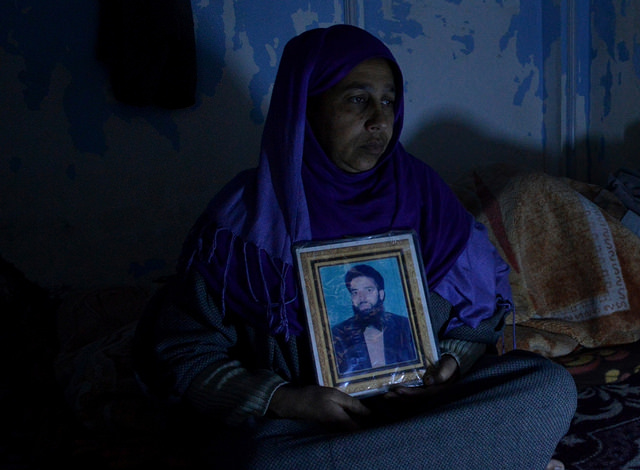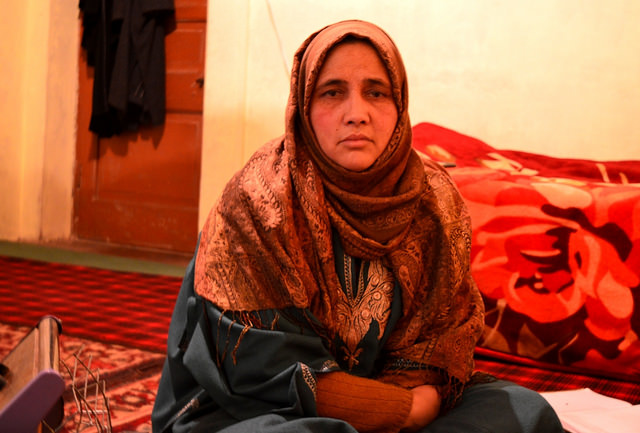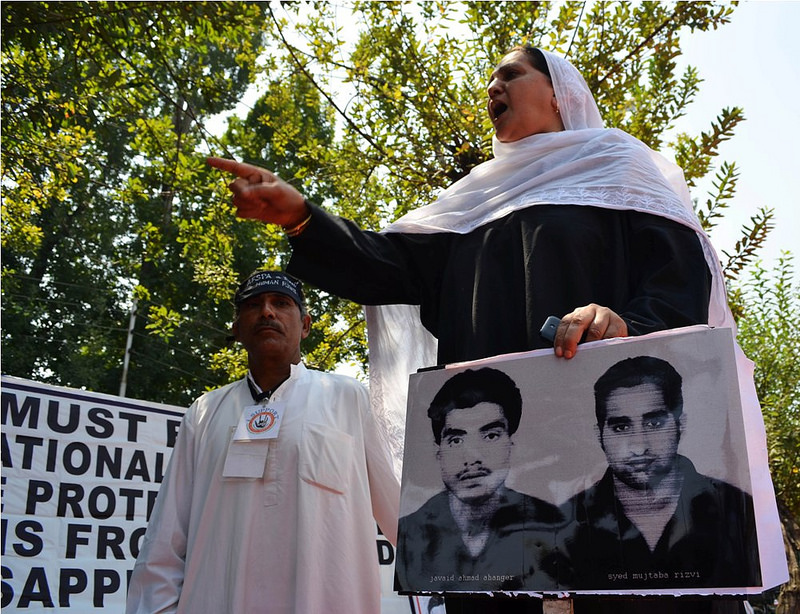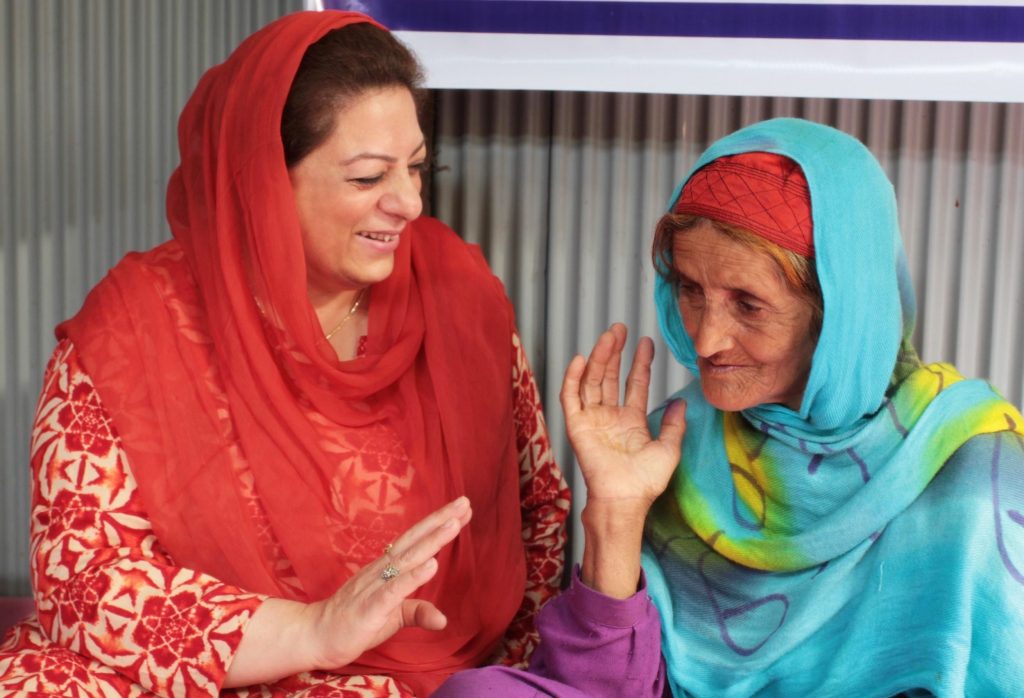We want the government to see what they have done, say women resisting in Kashmir through activism

By Raqib Hameed Naik, Twocircles.net
Srinagar: For the past four years, the support group, "Justice for Kunan Poshpora" has been commemorating February 23 and the struggle of the survivors of Kunan Poshpora mass rape, as the Kashmiri Women’s Resistance Day. However, it seems the government wants to continue every effort to muzzle their resistance.
On February 23, 2018, members of Jammu Kashmir Coalition of Civil Society (JKCCS) legal team and support group tried to visit Kunan Poshpora to meet the victims but were denied entry by the police. Last year also, the support group for Justice for Kunan Poshpora had planned a press conference on February 23, where the survivors of rape and torture were asked to speak. The Senior Superintendent of Police, Srinagar had denied them the permission a day earlier stating that, "there is usually an apprehension of law and order problem whenever the issue of Kunan Poshpora is raised".
In response to the banning of the event by the police, the State Human Rights Commission (SHRC), has observed that “there is no law which obliges a person to seek prior permission to hold a meeting in a private place within the four corners of a hall or a hotel for a lawful purpose”.
February 23 in Kashmir is now seen as a day when women stand out against increased militarisation and its associated and escalating sexual violence.
The story of Kunan Poshpora dates back to the intervening night of 22-23 February 1991, when the 68th Brigade of the Fourth Rajputana Rifles entered the village with an intention to perform a cordon and search operation, also known as "crackdowns" which were common practices during the 90s in Kashmir.
The sounds of Jackboots of Indian army were audible in the air. All the men of the village were herded to the nearest field, whereas women were asked to remain indoors and a house was identified to be used as an interrogation center. In the dead of the night, inhumane nature of humanity began to reveal itself with a cluster of monsters in human shape entering the houses and raping the women mercilessly. Young girls, married women, and old women, as per authentic reports were brutally raped. From a teenage girl to an 80-year-old woman, no one was spared.
A woman who had a baby in her womb was raped too. Mothers were raped in front of their small children who looked on, crying in horror. The whole village rose next morning to an eerie silence interrupted only by loud mourning cries. The residents cried on top of their voices, still shaken, unable to think about their next step.
But 27 years after the incident, victims of Kunan Poshpora along with thousands of other women who have suffered violence in one or the other form, in the unending conflict stand together, some seeking justice for themselves while some seek it for others.
In order to commemorate this day as Kashmiri Women's Resistance Day, and to highlight the strength and courage of Kashmiri women activists, TwoCircles.net spoke with four women activists from Kashmir; Safia Azad, Shabnum Wani, Parveena Ahangar and Ezabir Ali, all of whom have been at the forefront of seeking justice for the forcibly disappeared families and ensuring the rights of the "half-widows".
Safia Azad, 42
[caption id="attachment_421287" align="aligncenter" width="640"] Safia Azad, 42[/caption]
Safia Azad, 42[/caption]
Safia was 17 when her husband Humayun Azad, then 22 years old, was picked up by the soldiers of the 137th Battalion of the Border Security Force (BSF). On April 20, 1993, Humayun was on his way to visit his sister in Lasjan area of Srinagar when he was stopped by BSF soldiers and asked for his identity proof.
After examining the identity proof of Humayun, the guards dragged him out of the car, claiming they had prior information about his travel. The BSF soldiers bundled him into their vehicle and took him straight to their camp which was then located near New Convent school, Rajbagh. He was shifted to Papa II, an inglorious interrogation center and that was the last thing Safiya knew about him. Since then, she has never seen him. He is a victim of enforced disappearance.
To feed her lone child, Safia, now 42, started working in a local private kindergarten school where she looked after the admission work. She lives in the one-room kitchen which was given by her father in law as a share in the family property.
Presently, she is working in a book depot and earns Rs 3,000 per month which she considers insufficient for meeting day-to-day expenses. “This is the only source of my income. But more importantly, it keeps my mind occupied with something. Otherwise, the whole day my husband's memory haunts me.”
Some years after her husband disappeared, she was asked to remarry, but she refused, believing that her husband will return back home one day. “You know how it feels when a vital body organ is missing? Whenever I think about my husband, I feel like that,” says Safiya.
On the 10th of every month, she sits on a protest at Pratap Park in Srinagar, seeking answers from the government on the enforced disappearance of her husband and others who have met the similar fate. By this act, she aims to remind the state and central government how undemocratic their democracy is. She also attends conferences and seminars on the enforced disappearances where she speaks about her ordeal and intends to fight for justice until the end.
Shabnum Wani, 52
[caption id="attachment_421288" align="aligncenter" width="640"] Shabnum Wani, 52[/caption]
Shabnum Wani, 52[/caption]
On July 6, 1997, Shabnum’s husband Abdul Rashid Wani, then a 30-year-old truck driver, had to visit a trader in Parimpora, Srinagar to deliver an amount of Rs 21,000 for the wood he had supplied to a dealer outside Kashmir.
The moment he reached near JVC Mandi, the army vehicles overtook his scooter and stopped in front of him. At once they pounced upon Rashid, and took him inside the vehicle and drove away leaving behind his friend and scooter on the road.
She searched for her husband for years; in jails, army camps in Uri, Baramullah, Shriefabad, Badamibagh, Kot Bhalwal and various army camps in Jammu division of J&K but couldn’t find a trace of him anywhere.
After her husband’s disappearance, she experienced tension and post-traumatic stress disorder (PTSD) for which she now takes medicines. “I feel depressed and can’t sleep most of the times. I have been advised by the doctor to take medicines regularly. It costs me about Rs 1,500 per month which I cannot really afford,” said Shabnum.
But this is no deterrent to her struggle to seek answers from the government on whereabouts of her disappeared husband.
On the 10th of every month, holding a picture of her husband in one hand, she also sits in a silent protest at Partap Park Srinagar seeking an investigation into the people disappeared in the custody of the forces.
“From governments to courts, everyone has betrayed us. Now, this (the protest) is the last resort for us,” she says.
Parveena Ahangar, 58
[caption id="attachment_421289" align="aligncenter" width="800"] (Credits: Azaan Shah)[/caption]
(Credits: Azaan Shah)[/caption]
Parveena, 58, was born in Srinagar and got married at the age of 12. Despite not receiving any formal education, she has brought global attention to the issue of forced and involuntary disappearance in Kashmir. Her efforts have ensured that the cause hogs international attention. She has represented the cases of disappearances on various international platforms by traveling to the Philippines in 2000, Thailand in 2003, Indonesia in 2005, Chiang Mai in 2006, Geneva in 2008, Cambodia in 2009, London in 2014 and Norway in 2017.
On August 18, 1990, her 16-year-old son Javed, was picked up by the security forces from his relative’s place where had gone to study with his cousin. She hasn’t seen her son since that day.
In the later years, she visited several jails and torture centers across J&K to locate her lost son but every time, the harsh reality left her cold. “He isn’t here,” was the most common response.
In 1994, Parveena formed the Association of Parents of Disappeared Persons (APDP), to help her fight along with the families of other disappeared people. “For 5-6 years after 1994, all the victims used to meet twice: on 15th and 30th of every month at my home where we used to discuss our next course of actions.”
Then, says Parveena, a victim suggested that we start meeting at public places so that people also become familiar about their demands, pain and this suggestion was readily accepted by her after which the victim families starting meeting and organizing silent sit-in protests in Partap Park.
“Since the last 17 years, we have been organising a sit-in protest on the 10th every month, seeking information, accountability, and justice from the Indian Security establishments who are responsible for the disappearance of our family members.”
Since its inception, APDP under the leadership of Parveena has mobilised a large number of students, activists, and professionals from different parts of the world who through the association have been able to engage on issues of justice, reparation, impunity and legal course besides advocating the harsh struggle of the victim families.
In 2005, Parveena was nominated for Nobel Peace Prize for her strength and human rights activism. In 2017, Parveena Ahangar and human rights activist and lawyer Parvez Imroz won the prestigious Norway Rafto Prize 2017 for Human Rights.
Ezabir Ali, 40
[caption id="attachment_421290" align="aligncenter" width="640"] Ezabir Ali, 40[/caption]
Ezabir Ali, 40[/caption]
Ezabir has been helping women in conflict for over two decades. Overcoming the shackles of traditional Kashmir society, a woman in this conflict zone speaks about empowering the women, socially and economically, for which she has trained around 5,000 poor women in the concept of self-help groups, Thrift, and Credit etc.
Ezabir Ali’s name made news when she was instrumental in the Fatwa issued by a group of Ulema’s decreeing that ‘half-widows’ – women whose husbands have disappeared due to the conflict prevailing during the last two decades – can remarry if their spouses remain untraced for four years.
There was a lot of ambiguity in between different religious sects over the period of wait: some set four years and some set 90 years as the waiting period for the women, whose husband had disappeared due to conflict. “It was very tough to bring all the Ulemas of different Muslim sects on a single platform and hold deliberations. Team member of ‘Ehsaas’ a policy group and I made hectic efforts and finally all were willing to address the issue,” Ali says.
For the last 22 years, Ali has been working for the development of women and children. She has trained over 150 people as ‘barefoot’ counselors in the region, mostly to support women who are experiencing tension and post-traumatic stress disorder (PTSD) as a result of the conflict.
Peace and conflict in Kashmir are linked to patriarchal interventions. “The women don’t have the slightest idea about it. They feel it as a man’s job. I went to the women and made them conscious regarding their stake in peacebuilding,” says Ezabir.
She has been associated with Conciliation Resource (CR) since 2009 as a local coordinator on the Indian side of the Line of Control (LoC). She has done a mapping exercise to document the experiences of women (from different backgrounds, professions, regions, ethnicity) in understanding possible ways to enhance their role and involvement in Peacebuilding, so that women themselves suggest a way forward not just in terms of what everyone can do to make their positions better in society, but also what they would like to do for the society.
In November 2017, Ali’s policy group Ehsaas organized a consultative meeting of Islamic scholars representing different schools of thought and civil society members over the property rights of half-widows. She is presently trying to take different stakeholders on board to ensure property rights to the women.
Twocircles.net salutes the women of Kunan Poshpora and the brave women of Kashmir, continuing their struggle. #KashmiriWomensResistanceDay.
